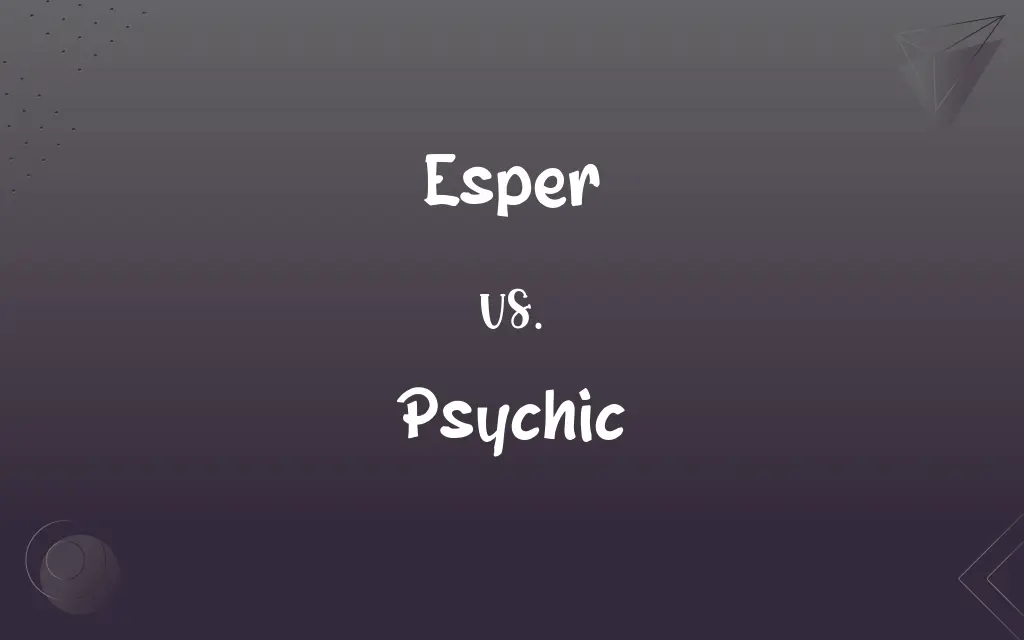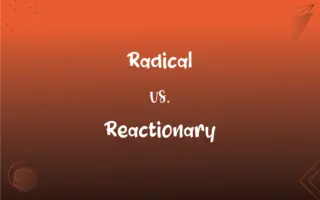Esper vs. Psychic: What's the Difference?
Edited by Aimie Carlson || By Janet White || Updated on March 3, 2024
An esper possesses innate or developed psychic abilities, often rooted in science fiction or paranormal contexts, focusing on mental powers. A psychic claims or is believed to have supernatural abilities, such as extrasensory perception or communication.

Key Differences
Espers are characters or individuals in science fiction and fantasy genres known for their psychic abilities, which are often presented with a scientific or pseudoscientific basis. These abilities can include telekinesis, telepathy, and other forms of mental manipulation. The term "esper" suggests a more structured understanding or development of these abilities, sometimes implying training or innate capabilities that have been honed. In contrast, psychics are generally associated with the supernatural or paranormal world, engaging in practices like fortune-telling, mediumship, and clairvoyance. Their abilities are often portrayed as innate gifts or connections to the spiritual realm, rather than skills developed through training or scientific enhancement.
The concept of espers often ties into speculative fiction, where the evolution of human capabilities or the effects of futuristic technologies on human minds are explored. This can involve narratives where espers are part of society, either as hidden figures or as recognized and possibly regulated entities. Psychics, on the other hand, are more commonly found in contexts related to mysticism, spirituality, and the occult. They are often portrayed as individuals with a special connection to unseen forces, offering insights or guidance through their purported abilities.
In literature and media, espers might be part of a storyline that includes government programs, scientific experiments, or futuristic societies where psychic abilities are analyzed, categorized, and possibly exploited. Psychics might be depicted in a more diverse range of contexts, from horror and supernatural genres to detective stories, where their insights or abilities provide crucial plot developments or resolutions.
The portrayal of espers and psychics can vary widely, with some narratives blurring the lines between scientific and supernatural interpretations of psychic abilities. However, the distinction often lies in the framing of their powers: espers are typically seen through a lens of scientific possibility or futuristic evolution, while psychics are more often connected to the mystical and the ancient.
Despite their differences, both espers and psychics serve to explore themes of knowledge, power, and the human experience beyond the physical senses. They allow narratives to delve into questions of what it means to understand others and the world in ways that transcend ordinary human capabilities.
ADVERTISEMENT
Comparison Chart
Basis
Science fiction, paranormal
Supernatural, paranormal
Abilities
Telekinesis, telepathy, etc.
Extrasensory perception, mediumship, etc.
Origin
Often rooted in scientific or pseudo-scientific explanations
Typically associated with supernatural or mystical origins
Contexts
Speculative fiction, futuristic societies
Mysticism, spirituality, occult
Portrayal
Structured, possibly trained abilities
Innate gifts, connection to the spiritual realm
ADVERTISEMENT
Esper and Psychic Definitions
Esper
An esper is an individual with psychic abilities, often explored within a scientific framework.
The novel's protagonist is an esper who uses telepathy to solve complex puzzles.
Psychic
A psychic possesses abilities beyond the normal senses, often related to the supernatural.
The psychic was called upon to communicate with spirits haunting the old mansion.
Esper
Espers often face ethical dilemmas related to their powers.
The young esper struggles with the morality of using her telekinetic powers to influence others.
Psychic
Their abilities are frequently portrayed as a natural gift or connection to the otherworldly.
From a young age, the psychic had visions that eventually led her to help solve cold cases.
Esper
Espers might be part of elite groups or societies in speculative fiction.
In the series, espers are trained at a special academy to hone their mental abilities.
Psychic
Psychics can serve as guides or mediators between the physical and spiritual worlds.
The psychic medium conducted a séance to relay messages from the beyond.
Esper
Their abilities can be the result of genetic mutations or scientific enhancements.
The esper gained his abilities after a government experiment went awry.
Psychic
A person apparently responsive to psychic forces.
Esper
Espers can be central to plots involving government or scientific intrigue.
Espers are hunted by a secret agency seeking to weaponize their powers.
Psychic
Of, relating to, affecting, or influenced by the human mind or psyche; mental
Psychic trauma.
Psychic energy.
Esper
A person who practices the development of psychic ability.
Psychic
Psychics may offer insights into the future or unseen realms.
People visited the psychic to get readings about their future prospects.
Esper
A person who has extrasensory perception.
Psychic
Capable of extraordinary mental processes, such as extrasensory perception and mental telepathy.
Psychic
Of or relating to such mental processes.
Psychic
A person who possesses, or appears to possess, extra-sensory abilities such as precognition, clairvoyance and telepathy, or who appears to be susceptible to paranormal or supernatural influences.
Psychic
(parapsychology) A person who supposedly contacts the dead; a medium.
Psychic
(gnosticism) In gnostic theologian Valentinus' triadic grouping of man the second type; a person focused on intellectual reality (the other two being hylic and pneumatic).
Psychic
Relating to or having the abilities of a psychic.
You must be psychic—I was just about to say that.
She is a psychic person—she hears messages from beyond.
Psychic
Relating to the psyche or mind, or to mental activity in general.
Psychic
Of or pertaining to the human soul, or to the living principle in man.
Psychic
Of or pertaining to the mind, or its functions and diseases; mental; - contrasted with physical.
Psychic
A person apparently sensitive to things beyond the natural range of perception
Psychic
Pertaining to forces or mental processes outside the possibilities defined by natural or scientific laws;
Psychic reader
Psychical research
Psychic
Affecting or influenced by the human mind;
Psychic energy
Psychic trauma
Psychic
Outside the sphere of physical science;
Psychic phenomena
Psychic
In narratives, psychics might help uncover hidden truths or solve mysteries.
The detective enlisted a psychic's help to find clues in a seemingly unsolvable case.
FAQs
Can espers and psychics coexist in the same fictional universe?
Yes, some fictional universes incorporate both espers and psychics, differentiating them by the source or nature of their abilities.
How do societies in fiction typically respond to espers?
Societal responses to espers in fiction can range from fear and persecution to reverence or exploitation, reflecting diverse attitudes towards the unknown.
Is the concept of an esper limited to any specific cultural or literary traditions?
While the term "esper" might have originated in certain cultural contexts, it has been adopted and adapted across a wide range of global literary and media traditions.
Do psychics in fiction always have accurate abilities?
The portrayal of psychic abilities in fiction varies, with some narratives presenting them as infallible and others as fallible or open to interpretation.
How are espers and psychics typically identified or discovered in fictional settings?
They may be identified through testing, unusual events that reveal their abilities, or by organizations that track individuals with such powers.
Are psychic abilities always inherent, or can they be developed?
Fictional portrayals of psychics vary, with some depicting abilities as inherent gifts and others suggesting they can be awakened or developed through practice or special knowledge.
Do psychics in literature always use tools like crystal balls or tarot cards?
While some narratives feature psychics using such tools for divination, others may portray their abilities as purely mental or spiritual without the need for aids.
Are espers always portrayed positively in fiction?
Espers, like any characters, can be portrayed with a range of moral alignments, from heroic to villainous, depending on the narrative.
Can someone be both an esper and a psychic in fiction?
In some narratives, characters might embody elements of both, blurring the lines between scientifically explained abilities and those deemed supernatural.
Do espers use their abilities in everyday life or only in extraordinary circumstances?
Depending on the narrative, espers might use their abilities in a range of contexts, from mundane daily tasks to critical, plot-defining moments.
How do authors and creators explore the ethical implications of psychic powers?
Psychic powers in fiction often raise ethical questions about privacy, consent, and the potential for abuse, serving as a narrative device to explore complex moral dilemmas.
How do psychics deal with skepticism or disbelief in their abilities within stories?
Psychics may face skepticism from other characters, leading to conflicts or challenges that test the validity and impact of their powers.
What challenges do espers face in controlling or understanding their powers?
Espers might struggle with control, the fear of discovery, the burden of their abilities, or the ethical implications of using their powers, providing depth to their character development.
Are there specific training or education systems for espers in fictional worlds?
Some narratives feature specialized institutions, mentors, or organizations dedicated to helping espers understand and control their abilities.
How do fictional narratives address the societal integration or segregation of espers?
Stories often explore themes of acceptance, fear, discrimination, and the use of espers in societal roles, reflecting broader social issues.
Can esper abilities evolve or change over time within a story?
Yes, esper abilities can develop, strengthen, or even wane, often as part of character growth or as a plot device.
How do espers and psychics perceive the world differently from ordinary people in fiction?
Their unique abilities may allow them to see beyond the physical realm, understand complex patterns, or communicate with non-physical entities, offering a different perspective on reality.
What role do espers and psychics play in genre crossovers, such as sci-fi mixed with fantasy?
In genre crossovers, they can bridge the gap between science fiction and fantasy elements, embodying the fusion of technological and mystical themes.
What impact do esper and psychic abilities have on personal relationships in fiction?
Their abilities can complicate relationships with issues of trust, privacy, and the burden of keeping secrets or protecting loved ones from potential dangers associated with their powers.
Are there common limitations or weaknesses to esper or psychic powers in fiction?
Limitations can include physical or mental strain, loss of control, specific conditions that need to be met, or resistance from those with opposing abilities.
About Author
Written by
Janet WhiteJanet White has been an esteemed writer and blogger for Difference Wiki. Holding a Master's degree in Science and Medical Journalism from the prestigious Boston University, she has consistently demonstrated her expertise and passion for her field. When she's not immersed in her work, Janet relishes her time exercising, delving into a good book, and cherishing moments with friends and family.
Edited by
Aimie CarlsonAimie Carlson, holding a master's degree in English literature, is a fervent English language enthusiast. She lends her writing talents to Difference Wiki, a prominent website that specializes in comparisons, offering readers insightful analyses that both captivate and inform.































































